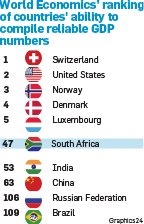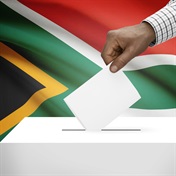
Are most of the world’s key economic data wrong?
UK-based think-tank World Economics last week released a new Data Quality Index (DQI) trying to show that, theoretically, most of the world’s all-important GDP numbers are wrong.
The DQI goes further, by ranking 154 countries in terms of the “quality” of the GDP numbers they produce.
African countries clutter the bottom of this ranking table, followed closely by South American countries.
The broad lessons from the index are that conditions theoretically tied to bad economic data exist everywhere – except in North America and Western Europe.
The DQI very pointedly gives China a terrible score, far lower than many African countries.
Like the statistics being questioned, however, the think-tank’s index also relies on a couple of largely untested presumptions.
Morten Jerven, a Norway-based economist who courted controversy on the African continent with his 2013 book Poor Numbers, is dismissive of the exercise.
“It adds very little value,” he told City Press of the new DQI this week.
Jerven said he had been approached to contribute to the index but found the predictive powers of its components unreliable.
Jerven’s book documented the incapacity of many African states’ statistical offices.
He also challenged the blind acceptance of economic data used to evaluate development policies or to proclaim that Africa is “rising”.
The Norwegian went on to face extreme criticism from African state statisticians, especially Stats SA’s statistician-general Pali Lehohla, and he was heckled when he
addressed a statistical conference in Gaborone, Botswana’s capital, in 2014.
Talking to City Press this week, he said the DQI “borrows biases from other data sources”.
One-fifth of each country’s score is composed of the score they received from the nongovernmental organisation Transparency International’s annual Corruption Perceptions Index.
As the theory goes, a corrupt government is more likely to cook the books.
The corruption scores, however, really just reflect the prejudices of the business executives surveyed, claims Jerven.
“Using second-hand data to evaluate second-hand data is not going to get you very far.”
Another fifth of the score depends on the official GDP per person in the country.
Apart from the circularity of judging the quality of GDP data by accepting it at face value, this measure also assumes that a lower GDP per person automatically means fewer resources for its national statistical office.
Densely populated China gets a low score on this count, despite being arguably the largest economy on earth.
Using the DQI method, the economic superpower’s ability to fund statistical work is presumed to be on par with that of South Africa and Costa Rica.
Another less contentious component is the age of the country’s base year for calculating GDP.
The potentially huge discrepancies between official economic measures and reality – because of outdated base years – have been dramatically illustrated by recent GDP rebasing exercises.
Ghana revised its GDP upwards by 60% in 2010; Nigeria did the same, by 90% in 2014.
According to Jerven, however, the age of a country’s base year generally has rather low predictive value, aside from spectacular exceptions.
He adds that rebasing can drag GDP numbers in the other direction too.
For instance, Zambia had previously rebased its GDP from 1970 to 1977. The former was a boom year for copper. The result was a far less impressive set of data.
The reason GDP growth is gauged from a base year is to avoid the need to completely survey the economy every year. Consequently, that year’s prices will determine the weighting of different sectors in subsequent years, even if prices change considerably. It also means new sectors will be captured properly only when a rebasing is done.
Theoretically, bad GDP data have monumental knock-on effects.
It is more or less the universal measure of governments’ economic success, and policies are routinely judged by what they do to GDP.
The world’s countries are divided into developmental categories principally on the basis of GDP per capita, which determines eligibility for trade preferences and aid.
GDP can be the basis of claims in the international arena, such as Brazil’s push for more power in institutions such as the International Monetary Fund on the basis of its GDP being larger than that of European members, which nonetheless have more votes.
GDP is also routinely invoked as a symbolic proxy for countries’ relative power and importance – for example, the contest between the US and China to be the largest economy in the world, and the same contest in sub-Saharan Africa between Nigeria and South Africa.




 Publications
Publications
 Partners
Partners









